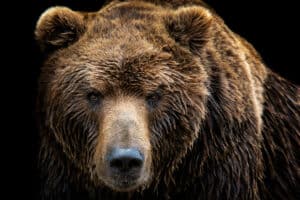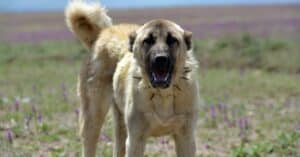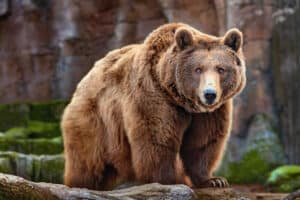Why do bears hibernate during the winter? Hibernation is one of the most fascinating and misunderstood behaviors in the animal kingdom. There has been some controversy among scientists as to whether bears go into torpor (temporary hibernation) or truly hibernate. Bears do not fit neatly into either camp because they are known to wake up quickly, they do not lower their body temperature to the surrounding conditions or reduce their metabolisms significantly – all characteristics of torpor. Skunks, opossums, and raccoons go into torpor. Some animals, like hummingbirds, are known to go into it daily. Wounded birds often go into torpor for a short while to recover from an injury.
When hibernation was defined in terms of temperature, bears were not considered hibernators. However, when biologists discovered the many metabolic changes that let black bears and grizzlies hibernate 7 months without eating, drinking, urinating or defecating, they realized that body temperature was only a small part of the equation. During “true hibernation,” animals become almost impossible to awaken. Woodchucks, ground squirrels, and some bat species enter true hibernation. In this state, their body temperature and heart rate plummet, and they will only wake up on rare occasions.
More confusion has arisen because bear behavior differs according to region and degree of fatness. Bear hibernation has been called torpor, winter sleep, dormancy, and carnivorean lethargy. Most physiologists now call it hibernation – even if it doesn’t fit neatly into the classic definition.
Whether you call it torpor or hibernation – it’s vital to understand precisely why bears do it. In this article, we’ll cover three reasons why bears hibernate, the science behind hibernation, and answer several frequently asked questions about bears.
Why Bears Hibernate
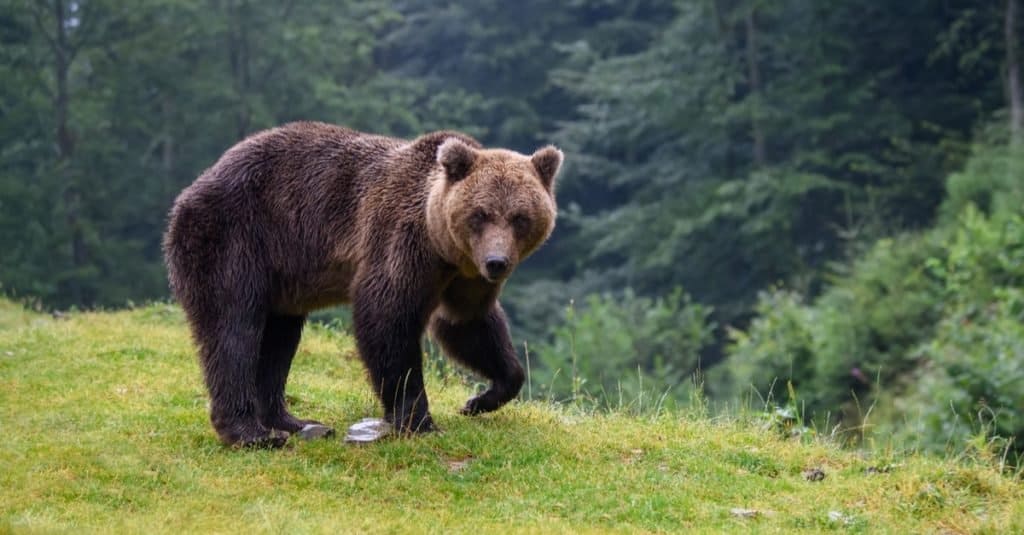
Bears hibernate due to falling temperatures, giving birth, and saving energy.
©Volodymyr Burdiak/Shutterstock.com
First, it’s worthwhile to mention that not every bear species hibernates. Panda bears, sun bears, Mexican black bears, and polar bears do not hibernate or only hibernate in specific circumstances. In the case of panda and sun bears, food is present year-round in their native habitats, which explains why they do not hibernate. As for Mexican black bears, they will only hibernate for a few weeks at most. Oddly, polar bears do not hibernate, both because they adapted to the cold and can find food throughout the summer and winter. However, female polar bears will den when pregnant and nursing newborn cubs. Those species that do hibernate include American black bears that live in colder climates, brown bears, grizzly bears, and Kodiak bears.
Even after much study, scientists still don’t understand everything about hibernation. What we do know is that bears who hibernate receive a biological trigger during the autumn to add on extra weight. They enter a state of excessive eating known as hyperphagia, during which they’ll consume up to 20,000 calories per day. Once it’s time to hibernate, bears receive a signal that tells them to seek shelter. While this exact process isn’t entirely clear, scientists refer to this signal as the Hibernation Inducement Trigger (HIT). This unique substance in their blood induces a torpor that drives bears to find shelter. Upon receiving this signal, bears will build a den, find a cave, or make a home out of a hollowed-out tree trunk to ride out the winter. On average, bears hibernate for three reasons: to avoid cold temperatures, birth and raise cubs, and conserve energy when food is scarce.
Due to Cold Temperatures
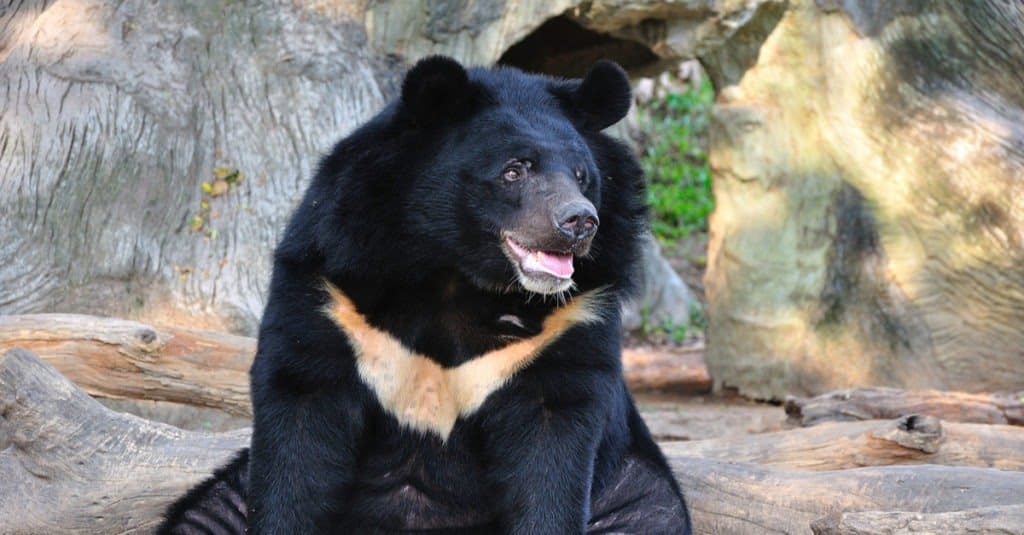
Bears use falling temperatures as a signal to seek shelter in preparation for the lean winter months.
©Tigger11th/Shutterstock.com
To clarify, bears don’t hibernate to explicitly avoid the cold. Many true hibernators do hibernate to avoid harsh weather, but not bears. Instead, cold weather is one of the triggers that bears use to let them know it’s time to hibernate. The ecological signal of colder, short days indicates to the bear that their environment is changing, and food will soon become harder to find. This helps explain why some bears hibernate longer than others and why some don’t hibernate at all. For example, Mexican black bears don’t hibernate or will hibernate for only a few weeks. Meanwhile, American black bears that live farther north can hibernate for up to seven and a half months. The colder the climate, the longer bears sleep.
Furthermore, recent research suggests that bears sleep for less time as temperatures rise or entirely forego hibernation. A 2017 study found that bears will end their hibernation six days earlier for every one degree Celsius increase in temperature. In addition, if the temperature is too warm, bears find it more and more difficult to stay asleep. They will wake up more often and may choose to simply stay awake entirely. As the weather warms, bears awaken from their slumber, believing that food is now available. In short, cold weather drives bears to hibernate, not because they want to avoid the cold, but because it lets them know that it’s an appropriate time to hibernate. Similarly, warm weather alerts the bears that it’s time to rise and start searching for food.
To Birth and Raise Newborn Cubs
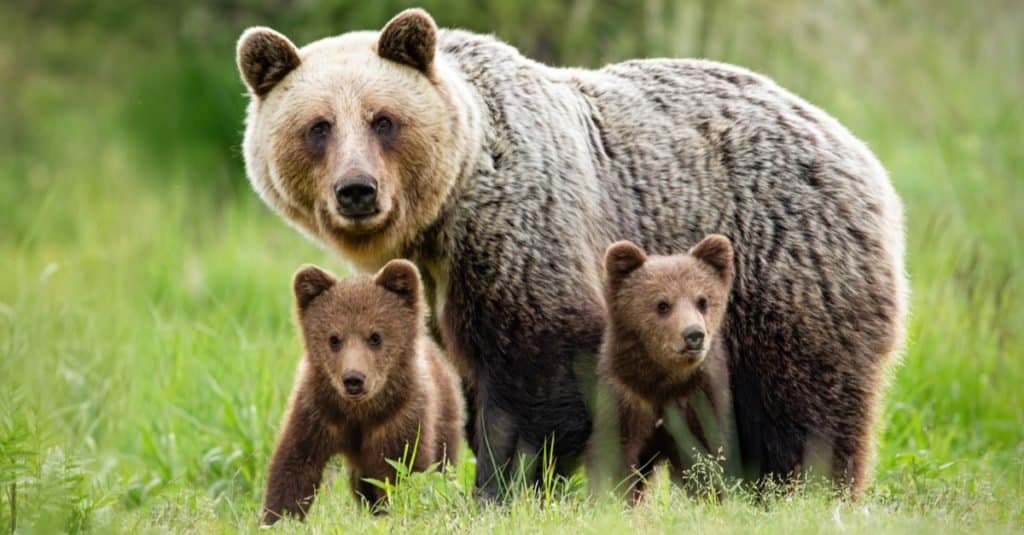
Newborn cubs cannot feed themselves until they reach around six months old.
©WildMedia/Shutterstock.com
Another reason why bears hibernate is to birth and raise newborn cubs. The gestation period for female bears is around 250 days. Given this, female bears that got pregnant in spring will deliver their cubs during winter. To protect their cubs from the elements and predators, female bears will den and ride out the winter. Usually, female bears give birth two months into hibernation. During labor, females’ heart rate increases, and they awaken to give birth. Upon birthing their cubs, they will slip back into hibernation.
At birth, bear cubs can not take care of themselves. In fact, cubs typically do not grow large enough to feed themselves until they reach six months old. While in the den, the cubs will suckle on their mother’s milk, which is around 30% fat. This rich fat provides them with all the nutrients they need while their mother continues to hibernate.
To Conserve Energy When Food is Scarce
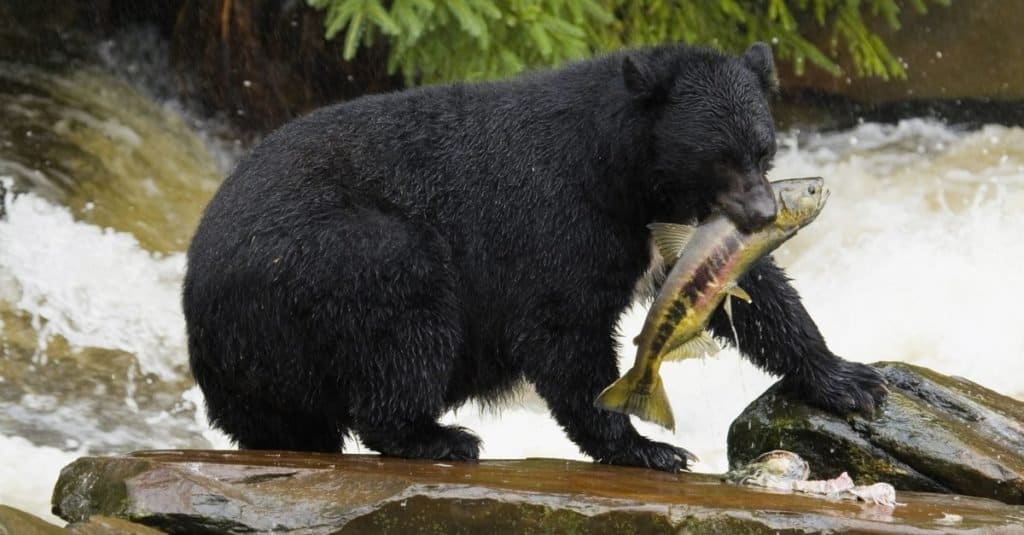
Bears put on weight during autumn in a phase called hyperphagia, and will consume up to 20,000 calories per day.
©emperorcosar/Shutterstock.com
The primary reason why bears hibernate is to conserve energy during the winter when food is scarce. To survive the winter, bears in cold climates enter hibernation to sustain themselves for months while living in a severe calorie deficit. Upon entering hibernation, bears fall into a cycle of deep sleep. While hibernating, most bears won’t eat or drink, and rarely if ever need to urinate or defecate. On average, they lower their body temperature between 8 to 12 degrees, and their heart rate and breathing slow down significantly. In a deep sleep, a bear may take a breath only twice per minute. By shutting down these essential bodily functions, their metabolism lowers, and they burn fewer calories.
Although bears do wake up during hibernation, they generally only arise to change posture, conserve heat, or consume readily available food if any is present. During hibernation, bears begin to break down their fat stores and burn them for energy. This fat, called brown fat, is very dense and allows bears to survive for months with no other sustenance. By not consuming protein, bears can maintain their strength, ensuring they don’t wake up too depleted or weak in spring. In addition, bears can completely recycle calcium in their bones during hibernation. This ability also prevents the bears from overly weakening, allowing them to wake in spring with enough strength to find food. By the time they awaken, most bears will have lost between 15% to 30% of their body weight.
Frequently Asked Questions About Bears and Hibernation
When do bears start hibernating?
Traditionally, bears start hibernating between late September and the start of October. The exact time depends on the local conditions where a bear lives.
When do bears stop hibernating?
Most bears end hibernation around April. However, bears may wake up earlier based on the temperature in their area.
The photo featured at the top of this post is © ArCaLu/Shutterstock.com
Thank you for reading! Have some feedback for us? Contact the AZ Animals editorial team.




